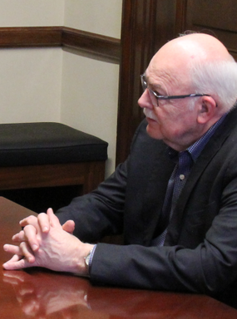Ibanez is a Japanese guitar brand owned by Hoshino Gakki. Based in Nagoya, Aichi, Japan, Hoshino Gakki were one of the first Japanese musical instrument companies to gain a significant foothold in import guitar sales in the United States and Europe, as well as the first brand of guitars to mass-produce the seven-string guitar and eight-string guitar. Ibanez manufactures effects, accessories, amps, and instruments in Japan, China, Indonesia and in the United States. As of 2017 they marketed nearly 165 models of bass guitar, 130 acoustic guitars, and more than 300 electric guitars.

In musical notation, a key signature is a set of sharp, flat, and rarely, natural symbols placed together on the staff. Key signatures are generally written immediately after the clef at the beginning of a line of musical notation, although they can appear in other parts of a score, notably after a double barline.

Forgery is a white-collar crime that generally refers to the false making or material alteration of a legal instrument with the specific intent to defraud anyone. Tampering with a certain legal instrument may be forbidden by law in some jurisdictions but such an offense is not related to forgery unless the tampered legal instrument was actually used in the course of the crime to defraud another person or entity. Copies, studio replicas, and reproductions are not considered forgeries, though they may later become forgeries through knowing and willful misrepresentations.

Art forgery is the creating and selling of works of art which are falsely credited to other, usually more famous artists. Art forgery can be extremely lucrative, but modern dating and analysis techniques have made the identification of forged artwork much simpler.

ESP Company, Limited is a Japanese guitar manufacturer, primarily focused on the production of electric guitars and basses. They are based in both Tokyo, Japan and Los Angeles, California, United States, with two distinct product lines for each respective market. ESP Company manufactures instruments under several names, including "ESP Standard", "ESP Custom Shop", "LTD Guitars and Basses", "Navigator", "Edwards Guitar and Basses", and "Grassroots". Their products range from Japanese-built custom shop instruments to lower end mass-production Korean, Indonesian and Chinese made instruments.

Music Man is an American guitar and bass guitar manufacturer. It is a division of the Ernie Ball corporation. The company is most well-known for its electric and bass guitars. Refusing to be known as a budget instrument company, the Music Man company largely produces arty guitars, especially after being acquired by Ernie Ball in 1984.

A negotiable instrument is a document guaranteeing the payment of a specific amount of money, either on demand, or at a set time, with the payer usually named on the document. More specifically, it is a document contemplated by or consisting of a contract, which promises the payment of money without condition, which may be paid either on demand or at a future date. The term can have different meanings, depending on what law is being applied and what country and context it is used in.
Sadowsky Guitars Limited is an American high-end guitar, bass guitar, and preamp manufacturer in Long Island City, New York.
Slingerland is an American drum kits brand, currently owned by Gibson. The brand is strongly related to jazz drummers, such as Gene Krupa or Buddy Rich, who used to play signature instruments made by the company.
Pilot licensing or certification refers to permits on how to operate aircraft that are issued by the Civil Aviation Authority (CAA) in each country, establishing that the holder has met a specific set of knowledge and experience requirements. This includes taking a flying test. The certified pilot can then exercise a specific set of privileges in that nation's airspace. Despite attempts to harmonize the requirements between nations, the differences in certification practices and standards from place to place serve to limit full international validity of the national qualifications. In addition, U.S. pilots are certified, not licensed, although the word license is still commonly used informally. Legally, pilot certificates can be revoked by administrative action, whereas licensing requires intervention by the judiciary system.

Pilot certification in the United States is typically required for an individual to act as a pilot-in-command of an aircraft. It is regulated by the Federal Aviation Administration (FAA), a branch of the U.S. Department of Transportation (USDOT). A pilot is certified under the authority of Parts 61, under 141 of Title 14 of the Code of Federal Regulations, also known as the Federal Aviation Regulations (FARs), or under part 107 rules for drone operation.

A flight instructor is a person who teaches others to fly aircraft. Especially Rotor/Helicopter Flight Instructors. Specific privileges granted to holders of a flight instructor qualification vary from country to country, but very generally, a flight instructor serves to enhance or evaluate the knowledge and skill level of an aviator in pursuit of a higher pilot's license, certificate or rating.
Clearfield Trust Co. v. United States, 318 U.S. 363 (1943), was a case in which the Supreme Court of the United States held that federal negotiable instruments were governed by federal law, and thus the federal court had the authority to fashion a common law rule.
Blank endorsement of a financial instrument, such as a cheque, is only a signature, not indicating the payee. The effect of this is that it is payable only to the bearer – legally, it transforms an order instrument into a bearer instrument. It is one of the types of endorsement of a negotiable instrument.
Ground Instructor is a certificate issued in the United States by the Federal Aviation Administration. There are three classes of holder, licensed to provide the ground instruction element in the training of three groups:
The Ibanez K5 is the signature bass for metal band KoRn's bassist Reginald Fieldy Arvizu.
Kiesel Guitars is an American manufacturer of electric guitars and electric bass guitars located in Southern California. It was founded in 2015 and took over the guitar and bass portions of Carvin Corporation.

The 2018 North Dakota Secretary of State election occurred on November 6, 2018, to elect the North Dakota Secretary of State, concurrently with various other state and local elections. Six-time incumbent Republican Secretary of State Alvin Jaeger was eligible to run for re-election to a seventh term in office, but withdrew from his party's primary after failing to receive the endorsement. When the primary winner withdrew from the general election race, Jaeger and fellow Republican Michael Coachman each gathered and turned in signatures to run as independent candidates. Libertarian Party candidate Roland Riemers failed to get enough primary election votes to make the general election ballot both in an initial count and in a court-ordered recount. Democratic-NPL state representative Joshua Boschee was the only candidate who advanced from the primary and the only candidate that had his party listed on the general election ballot.









